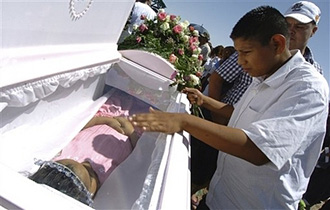
|  |  |  Editorials | Issues | July 2008 Editorials | Issues | July 2008  
More Kids Caught in Mexico Drug-War Crossfire
 Alicia A. Caldwell - Associated Press Alicia A. Caldwell - Associated Press
go to original


| | An unidentified relative of Alexia Belem Guerrero touches her coffin during the burial ceremony at a cemetery in the border city of Ciudad Juarez, Mexico June 12, 2008. Moreno, who was 12, was shot in the head while riding in a vehicle as she was returning from school, apparently caught in the crossfire during a gun battle between drug smugglers. She is part of an alarming trend of children being caught in the increasingly bloody battle for control of lucrative drug smuggling routes. (Diario de Juarez/Luis Torres) | | |
Ciudad JuarEZ, Mexico - Twelve-year-old Alexia Belen Moreno was afraid living in her father's house in Ciudad Juarez, where drug cartels are fighting a bloody war. She begged to move in with her mother just across the border in El Paso, Texas. Her parents agreed — but asked her to stay a few more weeks to finish school.

Three days later, Alexia was shot in the head blocks from her home in broad daylight. Authorities believe she was caught in the crossfire when gunmen killed two men riding with her in a car.

Alexia's death is part of an alarming trend of children dying in Mexico's drug wars.

Mexican officials say they don't track the number of child deaths from drug-gang violence. But newspaper tallies find nearly 50 kids have been killed this year — and a code of ethics in which hit men took care to avoid harming children appears to be evaporating.

In one of the more brazen cases, gunmen targeting a Tijuana police commander in January also killed his wife and 11-year-old daughter. In the same month in the same city, a 4-year-old boy died when his parents, mistakenly identified, were attacked. In the northern city of Fresnillo last month, a 13-year-old boy was killed in a shootout.

In Ciudad Juarez, details are murky of Alexia's death. Authorities haven't even determined the identities of the slain men with whom Alexia and two friends were riding on June 10, although they believe they were involved in the drug trade.

The other children ran to safety but are too afraid to talk with reporters or investigators. Alexia's family is also in hiding and has refused to cooperate with police. Her parents' only public remarks came at the girl's funeral.

Lorena Melendez Torres said her daughter had asked to move to El Paso the Saturday before she was killed.

"The only thing I want is justice, justice for my daughter. She was so innocent. She was just a child," Melendez said.

Her father sobbed uncontrollably during the service, refusing to accept his only daughter's death.

The killings of Alexia and other children have parents in Ciudad Juarez on edge.

Aurora Bueno said she almost never lets her 15-year-old daughter Wendy go anywhere alone.

"We go only to the store, the bank and school," Bueno said, standing with Wendy at a bus stop. "Other than that, we stay inside. It's just not safe."

Mexico expert George W. Grayson says the stakes in the drug war are so high, civilian casualties have simply become a cost of doing business.

"Most of these, I think when the youngsters get hit or killed, it's kind of collateral damage," said Grayson, a professor at the College of William & Mary in Virginia. "I think the care for civilians has eroded."

After taking office in December 2006, Mexican President Felipe Calderon deployed more than 25,000 soldiers to break up drug cartels in their strongholds, including Ciudad Juarez. But the gangs have responded with violence, and more than 4,000 people have died nationwide in drug-related assaults since the crackdown.

The killing of children has angered so many in Ciudad Juarez that people believed to be drug traffickers hung anonymous banners on June 16 denying involvement. One banner, presumably from a rival cartel, blamed the Sinaloa cartel for crossing a line, accusing it of shooting women and children.

"Violence like this didn't used to happen," the banner said. |

 |
|  |



